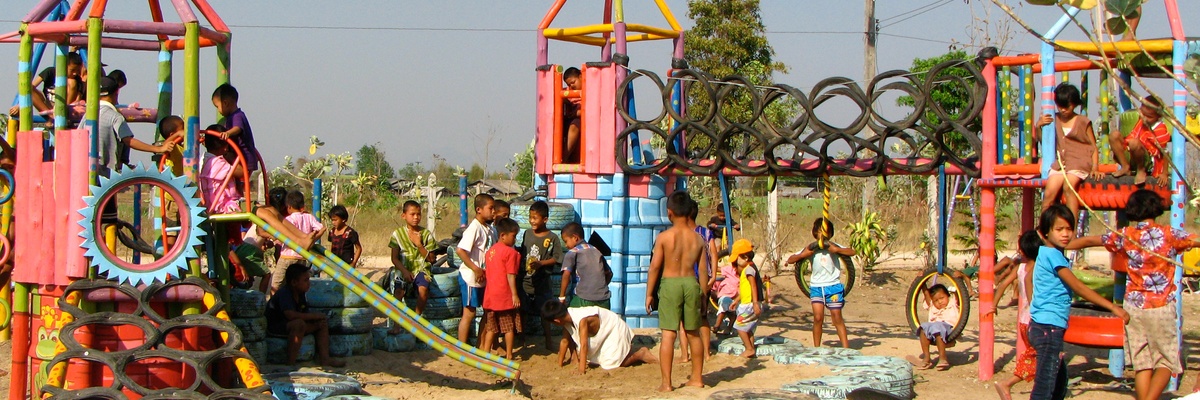Listen
As you begin your playground journey, it important to remember that playgrounds do not bring play to children or communities. In every corner of the globe and across all cultures, children are at play. Children are born with an unstoppable drive to foster their own growth and development: to explore, discover, create, and delight. In every community there are also adults nurturing and encouraging these children, equipping the next generation with the tools to address the challenges tomorrow will bring.
Playgrounds are simply spaces and structures built to validate and enrich this work already in motion. In the “Listen” phase of the playground process, your job is to listen carefully to how the community is already supporting their children. This information will inform both the direction and the content of the design. In this chapter of the handbook you’ll find:
+ An introduction to Asset Based Community Development + How to lead “Community Consultations” + Guidance on working with a community to determine whether or not a play space is a community priority + “Community Consultation” activities aimed at gathering ideas for design from children, teachers, parents, and community members.
Download the full handbook here
Plan
If the community has decided to move ahead with building a playground, it’s time to get organized! In this chapter, we’ll cover how to create a plan for the logistics of your build. Consider organizing a team of parents, teachers, and community volunteers to spearhead the planning process together. Not only will it divide the workload, but involving multiple stakeholders throughout the playground process will create more ownership of the project in the long run.
As you think about how to make your project happen, your mind is probably swimming with questions! In the next several pages, we’ll work through the following topics and provide some tips and tricks for successful playground planning:
+ What is a “Project Page” and how do I set it up? + What materials will we need? + What tools will we need? + Who will build the playground? + How do we create a budget for our playground? + How will we raise the money for our playground? + How long does it take to build a playground? + What do we need to do to prepare for the build?
Download the full handbook here
Design
You have listened and planned, and now you are finally ready to design your playground! Designing a playground is so much more than just throwing elements into a space. The design phase is about gathering what you learned in the “Community Consultations” and using best practices of playground design to translate the input of children, parents, teachers, and community members into a playground design that can be built from appropriate local materials and fit within your budget. Ready to get started?
In this chapter we’ll cover: + Specific resources useful in the design process + Examples of how to translate the information and inspiration gathered in the “Community Consultation” process into a playground design + 10 principles of playground design + How to choose materials + How to ensure your design is safe (but still has a healthy amount of risk) + How to create a design scheme + How to present your design and gather community feedback
Download the full handbook here
Build
You’re finally ready to build your playground! All the hard work you put into planning and fundraising is about to take shape. Playground building is dynamic, challenging but super satisfying work. Unlike a house, playgrounds can come together very quickly and big changes happen everyday. Be prepared to constantly be problem solving. And no matter how much planning you’ve done, don’t expect everything to go according to plan. Arm yourself with patience, a flexible attitude, a good sense of humor, and plenty of food, water, and rest.
In this chapter you’ll find: + Checklists to help the “Project Leader” keep the build on track and avoid any unforeseen challenges + Guidance on building with tires + Tips on specific materials
Download the full handbook here
Maintain
Every day playgrounds get stomped on, swung around, drummed on, and kicked. Playgrounds take a daily beating. And that means that even the toughest, strongest, most expensive playground will require maintenance sooner than you think. It’s helpful to think of a playground like a garden. Planting a garden is not a one-off event - keeping a garden requires regular care and attention. So do playgrounds. Any playground that is unmaintained will eventually become unsafe. In this chapter we’ll cover:
+ How to plan for the long term maintenance of the project throughout the playground process. + Sample maintenance checklists. + Advice on developing playground rosters to avoid over-stressing playground equipment. + Tips on creating playground rules. + Playground resources for teachers.
Download the full handbook here









 "Welcome to Playground Ideas. Play is so important and we want to help you and your community to build a play space that's specific to your needs. Join our community and get access to all the resources you need to build a cheap and safe play space using recycled and local materials."
- Marcus Veerman, Founder & CEO of Playground Ideas
"Welcome to Playground Ideas. Play is so important and we want to help you and your community to build a play space that's specific to your needs. Join our community and get access to all the resources you need to build a cheap and safe play space using recycled and local materials."
- Marcus Veerman, Founder & CEO of Playground Ideas
